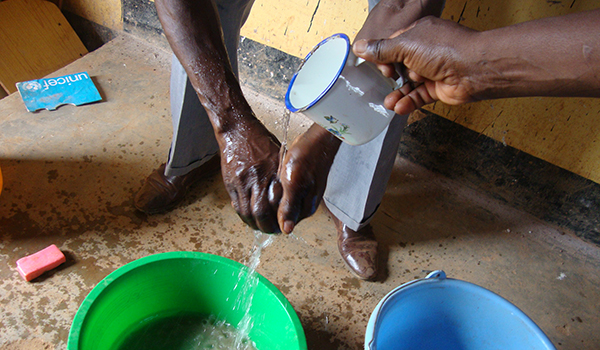2019-12-12
Addressing antimicrobial resistance is a multifaceted challenge, but what is often overlooked is reducing the need to use antibiotics. Antibiotics are regularly relied on to treat infections in healthcare facilities and communities that don't have adequate water, sanitation and hygiene services.

As the pillars of WHO’s AMR Global Action Plan reflect, addressing antimicrobial resistance remains a multifaceted challenge. However, what is often overlooked is reducing the need to use antibiotics in the first place. Antibiotics are regularly relied on to treat infections in healthcare facilities and communities without adequate water, sanitation and hygiene (WASH). If practical steps are taken to address WASH in these low-resource communities, this antibiotic use could be reduced.
Recent reports from the World Bank and Chatham House confirm that unhygienic conditions are a major cause of antibiotic use in low- and middle-income countries, and that water, sanitation and hygiene improvements are a cost-effective way to reduce this. Practical steps to improve WASH, especially in low-resource settings, could reduce antibiotic use and thereby resistance, making a huge contribution to controlling the spread of antimicrobial resistance.
Alison is Technical Lead for Health at WaterAid Australia, Celina is a Policy Advisor at ReAct, Leah is WaterAid Sweden’s WASH and Health Advisor and Mengying is a Policy Advisor at ReAct.
More news and opinion from 2019
- ReAct’s 2019 wrap up and 2020 expectations
- Blog post by UNDP and ReAct: Antimicrobial resistance: An emerging crisis
- Water, sanitation and hygiene services critical to curbing antibiotic quick fix
- Diagnostics: Antibiotic susceptibility
- ReAct highlights during World Antibiotic Awareness week 2019
- 2019 AMR photo competition prizes announced
- Launch of UNICEF’s institutional guidance on antimicrobial resistance
- Proposed ban on colistin for animal use announced in Indonesia
- School children led celebration of World Toilet Day and World Antibiotic Awareness Week
- 10 Innovate4AMR-winning teams enjoyed 3-day workshop in Geneva
- After 4 collaborative meeting days: Actions for the future in Latin America
- Four key points from joint comments to One Health Global Leaders Group on AMR
- Why are children more vulnerable to AMR?
- Dr Yoel Lubell, Health Economist, on Thailand, AMR, UCH and cultural factors driving AMR
- UHC and AMR: The Thai Experience
- Why do effective antibiotics matter for quality of care and patient safety?
- New ReAct policy brief: Antimicrobial resistance and universal health coverage – What’s the deal?
- Three key takeaways from the ReAct Africa conference
- Diagnostics: Species identification
- AMR-specific indicator proposed for monitoring Sustainable Development Goals
- Five focus areas at the 2nd Ministerial Conference on AMR hosted by the Netherlands
- Safety concerns of fecal microbiota transplants
- Upcoming ReAct Africa Conference: universal health coverage and antimicrobial resistance in focus
- Mother Earth conference in Argentina – the environment in focus
- Diagnostics: What are we talking about?
- Connecting global to local civil-society-agenda on AMR at CSO convening in Geneva
- ReAct colleagues featured in WHO Bulletin as leading profiles in the work on reacting to antibiotic resistance
- RAN stakeholder at WHO IPC consultation – for standards and guidelines in African Union member states
- WHA conversation on Antibiotic Resistance as a Global Development Problem co-organized by ReAct
- Insights from ReAct Asia Pacific project on antibiotic stewardship in secondary level hospitals in India
- Open letter to UN Member States from former IACG members Anthony So and Otto Cars
- ReAct UHC Intervention at UNGA Multi-stakeholder Hearing for High-level Meeting on UHC
- ReAct Latin America honors Earth Day
- Medicines Patent Pool’s view on the role of licenses for antibiotics – World Intellectual Property Day
- Second time for Innovate4AMR competition!
- World Health Day 2019: Universal Health Coverage
- Diagnostics: Constraints for successful implementation
- Antibiotic Shortages: magnitude, causes and possible solutions: A new WHO meeting report
- Erry Setyawan, FAO, on Indonesian NAP: We need to work together to make it possible to manage AMR
- ReAct’s new 5-year strategic plan receives funding from Sida
- How infections spread and how to stop them
- Generating data for policy and practice
